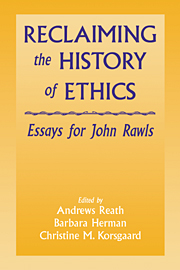Book contents
- Frontmatter
- Contents
- List of Contributors
- Introduction
- Aristotle on the Soul's Conflicts: Toward an Understanding of Virtue Ethics
- Coercion, Ideology, and Education in Hobbes's Leviathan
- The Hobbesian Side of Hume
- The Natural Goodness of Humanity
- Metaphysics, Philosophy: Rousseau on the Problem of Evil
- Within the Limits of Reason
- A Cosmopolitan Kingdom of Ends
- Legislating for a Realm of Ends: The Social Dimension of Autonomy
- Kant on the Objectivity of the Moral Law
- Kantian Virtue: Priggish or Passional?
- Taking the Law into Our Own Hands: Kant on the Right to Revolution
- Kant on Aesthetic and Biological Purposiveness
- Kant on Ends and the Meaning of Life
- Community and Completion
Introduction
Published online by Cambridge University Press: 04 November 2009
- Frontmatter
- Contents
- List of Contributors
- Introduction
- Aristotle on the Soul's Conflicts: Toward an Understanding of Virtue Ethics
- Coercion, Ideology, and Education in Hobbes's Leviathan
- The Hobbesian Side of Hume
- The Natural Goodness of Humanity
- Metaphysics, Philosophy: Rousseau on the Problem of Evil
- Within the Limits of Reason
- A Cosmopolitan Kingdom of Ends
- Legislating for a Realm of Ends: The Social Dimension of Autonomy
- Kant on the Objectivity of the Moral Law
- Kantian Virtue: Priggish or Passional?
- Taking the Law into Our Own Hands: Kant on the Right to Revolution
- Kant on Aesthetic and Biological Purposiveness
- Kant on Ends and the Meaning of Life
- Community and Completion
Summary
John Rawls is known all over the world for the revolutionary achievements in political philosophy embodied in A Theory of Justice and Political Liberalism. Almost immediately upon publication, Rawls's account of the aims and values of liberalism became the starting point for subsequent work in political philosophy. Many philosophers following Rawls have disagreed with him, taking issue with his methodological devices (e.g., the veil of ignorance as a device of representation), or the two principles of justice, or the account of primary goods as the proper basis of distribution. Others have denied that liberalism as he describes it draws on a sufficiently substantive conception of the self, or would lead to a sufficiently rich and supportive community life; or they have been skeptical of his attempts to show that those who disagree deeply on religious and metaphysical issues and favor different conceptions of the good life may still agree on principles of justice and political institutions. And many other philosophers have been convinced by Rawls's views, and have taken up their defense. There is little dispute on either side that these are the central issues and the appropriate terms of discussion. In this way, Rawls's work has provided the focal point for much of the political philosophy of the last twenty-five years.
It is also now fairly commonplace to credit Rawls's work with the revitalization of moral philosophy that began in the early 1970s. By the late 1960s, moral philosophy was in danger of becoming sterile and trivial. The prevailing emphasis on the analysis of ethical concepts and “metaethical” issues had turned the attention of philosophers away from practical questions.
- Type
- Chapter
- Information
- Reclaiming the History of EthicsEssays for John Rawls, pp. 1 - 6Publisher: Cambridge University PressPrint publication year: 1997
- 1
- Cited by



